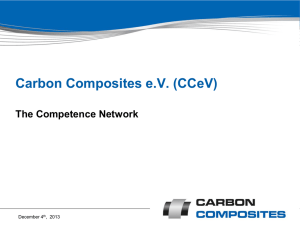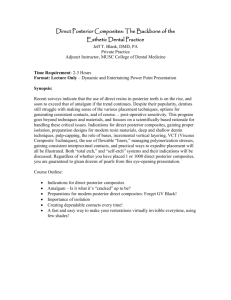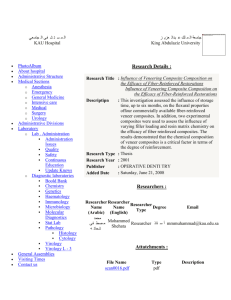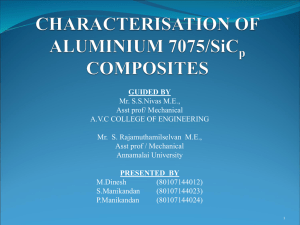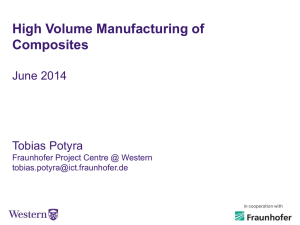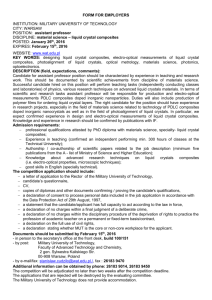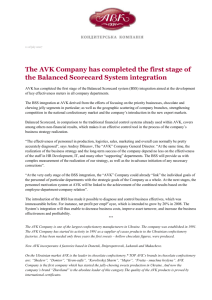Document 7079116
advertisement
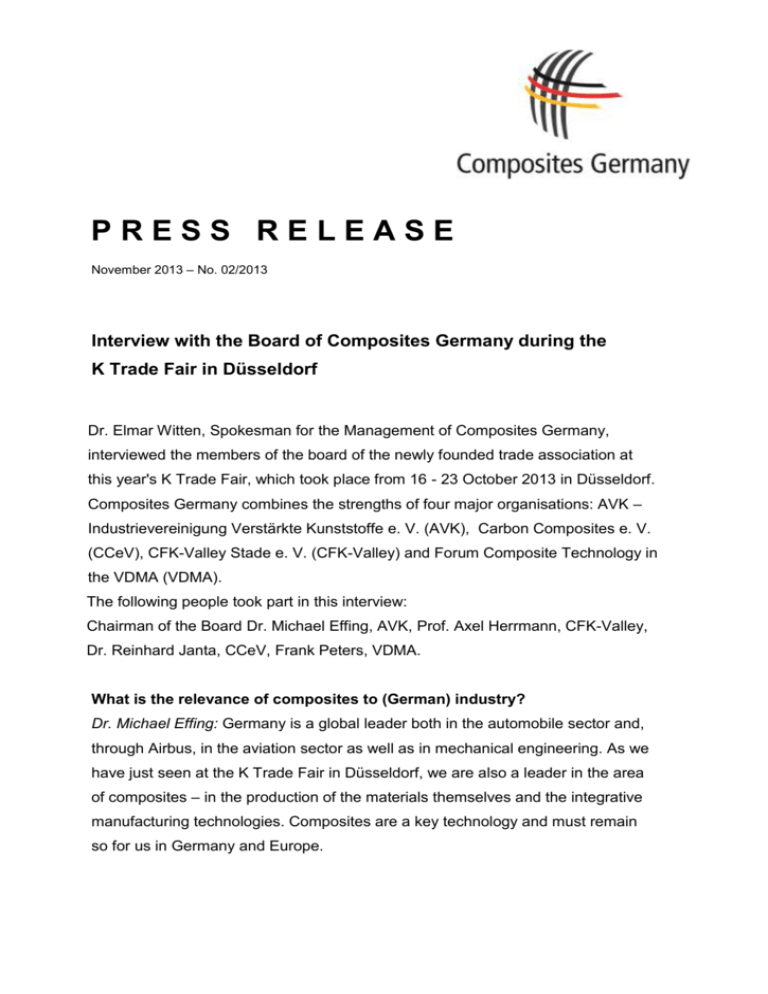
PRESS RELEASE November 2013 – No. 02/2013 Interview with the Board of Composites Germany during the K Trade Fair in Düsseldorf Dr. Elmar Witten, Spokesman for the Management of Composites Germany, interviewed the members of the board of the newly founded trade association at this year's K Trade Fair, which took place from 16 - 23 October 2013 in Düsseldorf. Composites Germany combines the strengths of four major organisations: AVK – Industrievereinigung Verstärkte Kunststoffe e. V. (AVK), Carbon Composites e. V. (CCeV), CFK-Valley Stade e. V. (CFK-Valley) and Forum Composite Technology in the VDMA (VDMA). The following people took part in this interview: Chairman of the Board Dr. Michael Effing, AVK, Prof. Axel Herrmann, CFK-Valley, Dr. Reinhard Janta, CCeV, Frank Peters, VDMA. What is the relevance of composites to (German) industry? Dr. Michael Effing: Germany is a global leader both in the automobile sector and, through Airbus, in the aviation sector as well as in mechanical engineering. As we have just seen at the K Trade Fair in Düsseldorf, we are also a leader in the area of composites – in the production of the materials themselves and the integrative manufacturing technologies. Composites are a key technology and must remain so for us in Germany and Europe. 2 What was your reason for founding another association for the composites industry? Dr. Reinhard Janta: We have not founded another association but an umbrella organisation. We aim to bring together the common themes and interests of the individual associations and communicate these to the outside world with a single voice. This will give our industry both a face and a mouthpiece. What are the benefits of being a member of the umbrella organisation Composites Germany to AVK/ CFK Valley/ CCEV/ VDMA? Prof. Axel Herrmann: There is massive investment taking place all over the world in CRP technologies. By coordinating and combining our activities in Germany, we can improve the strength of the lightweight construction industry and thus Germany as a location for industry in general. Our international competitiveness will improve and our member companies will profit as a consequence. What are the special challenges facing Germany as a high wage country as it competes with other composites manufacturing countries? Frank Peters: The wage component of overall costs, especially for parts manufactured in small numbers using manual processes, is generally quite high. This means that automation and creating links between processes for large series component manufacturing has to be seen as both a challenge and an opportunity. However, Germany's innovative capabilities and know-how in automation mean that it currently plays a leading role in manufacturing composite components. What are the individual factors driving the development of the composites market? Dr. Reinhard Janta: For Germany, the development of the market is being driven by important themes such as resource efficiency, the transition to renewable energy sources and the innovations required to accomplish these challenges. Changing conditions are forcing us to seek out new solutions and use our resources more efficiently. We can achieve this better by working together than by working alone. 3 What material properties do OEMs currently require in the area of aircraft construction? Prof. Axel Herrmann: Speed is always important – and this is achieved through fast industrial processing and rapid hardening/curing without any drop-off in performance. OEMs are looking for high-performance injection resins or infusion resins as substitutes for prepreg systems, ways to exploit the better drapability of semifinished textile products and efficient materials with the appropriate flame and smoke retardant properties to be used in cabins and interiors. Here too, manufacturers require fast industrial processes and compatible materials. Our vision: the capability to integrate functionality! What important material properties are OEMs currently seeking in the automotive sector? Dr. Reinhard Janta: Our cars must become lighter in order to save energy, reduce CO2 emissions and make electromobility a more realistic and attractive proposition. The aim is to have 1 million electric cars on German roads by 2020. These cars must become much lighter in order to extend their range to an acceptable level. Lightweight construction based on composite materials and structures is one way that this can be achieved. What are the primary objectives that Composites Germany has set itself? Dr. Michael Effing: Composites Germany will primarily deal with national and international public relations and the presentation of the sector to the outside world. We see ourselves as the mouthpiece of the composites industry enabling us to speak with a single voice. Essentially, we are concerned with promoting the innovations and technologies developed by this expanding industry. To achieve this, we are planning coordinated activities under the banner of "Composites Germany". Is Composites Germany currently involved in any specific activities? Frank Peters: Since July 2013, our partner organisations have been conducting semi-annual surveys of all their member companies in order to gather market 4 information. We are also already running projects in the area of norms and standardisation with a focus on material properties and testing methods. Naturally, we will be continuing our series of joint meetings on specific topics and supplementing these in future with appearances at various trade fairs. Can other organisations become members of Composites Germany? Dr. Michael Effing: Composites Germany was founded last September as an umbrella organisation to combine the strengths of 4 major partners (AVK, CCeV, CFK Valley and VDMA). We see 2014 as a year of consolidation. We want to refine our joint strategy and discover synergies. Other associations/organisations will be welcome to apply to become members in 2015. How can companies contribute to or represent their interests in Composites Germany? Prof. Axel Herrmann: Joint events, trade fairs and symposia will provide suitable platforms. However, companies can also contact the head office of Composites Germany directly. We will then put them in touch with the appropriate contacts within our existing networks to answer their questions. What is the importance of composites for final consumers and their product purchasing decisions? Frank Peters: Composite materials have already acquired a positive image in the leisure sector. In automotive construction, people associate composites with lightweight design and conservation of resources. As BMW's "Project i" clearly demonstrates, promoting composites directly also offers an opportunity to market products through attributes such as innovation and progress. 5 Photo AVK: Members of the Board of Composites Germany, from left to right: Dr. Michael Effing (AVK), Prof. Axel Herrmann (CFK-Valley), Dr. Reinhard Janta (CCeV), Frank Peters, VDMA Press enquiries: Composites Germany, Dr. Elmar Witten, Spokesman for the Management Tel. +49 (0)69/27 10 77-0, E-Mail: elmar.witten@composites-germany.org; www.composites-germany.org
